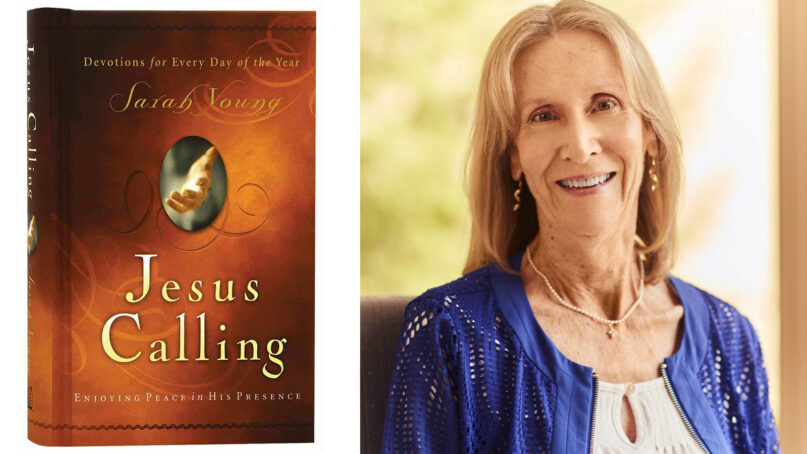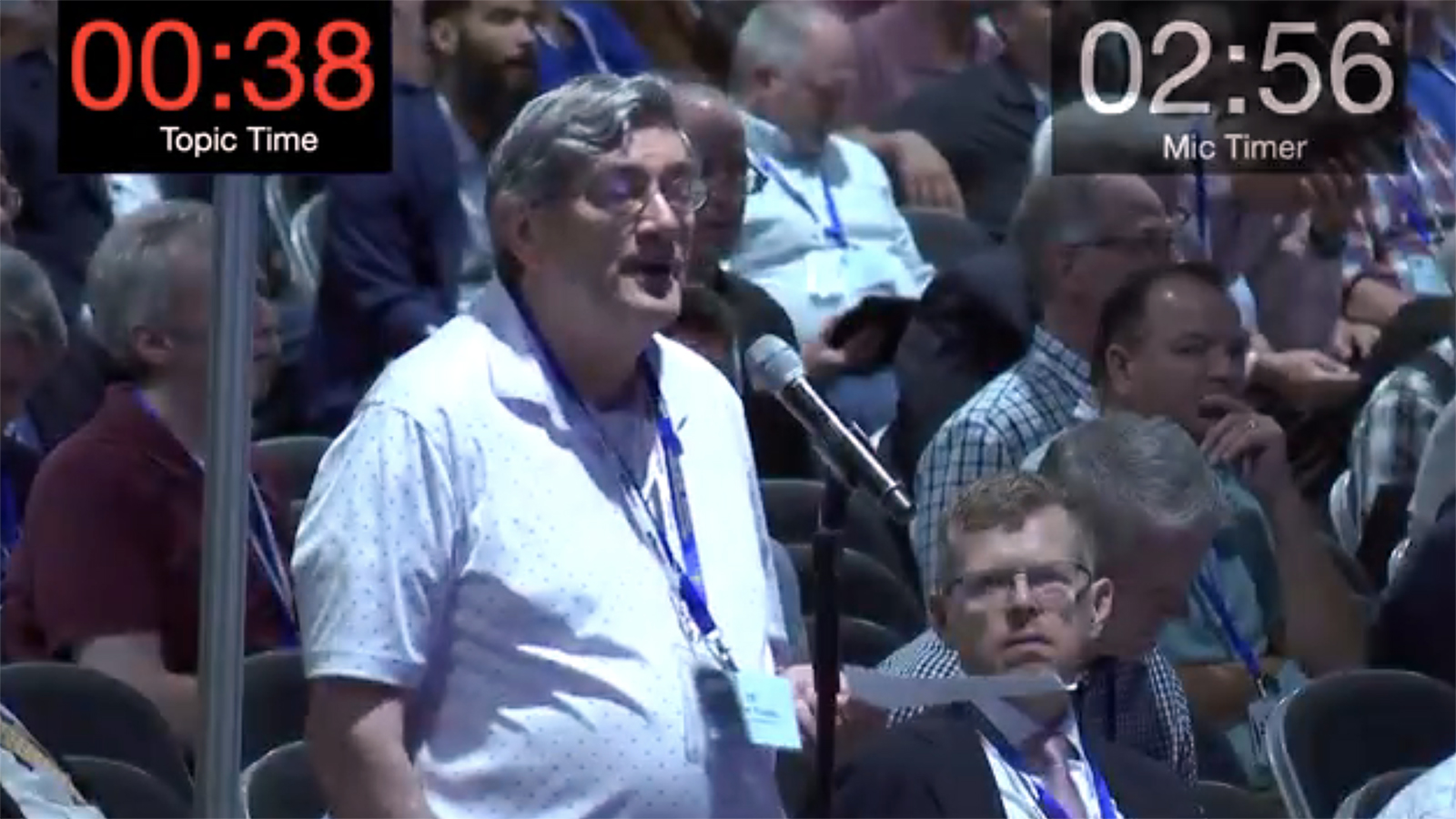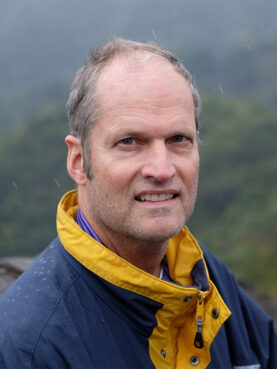At a recent PCA meeting, critics of ‘Jesus Calling,’ written by Sarah Young, called for an investigation to see if the book was safe for Christians to read.

“Jesus Calling: Enjoying Peace in His Presence” and author Sarah Young.
(Courtesy images)
June 20, 2024
By Bob Smietan
(RNS) — Evangelicals love to talk to Jesus.
And often, they say, he replies — giving them advice, comfort and words of encouragement.
That is one reason why “Jesus Calling,” a book of daily devotions that combines Bible verses with friendly messages written as if Jesus were speaking, has been one of the bestselling Christian books of the past 20 years.
Written by a former Presbyterian Church in America missionary, “Jesus Calling” and its ancillary products have sold more than 45 million copies since 2004. The book is currently fifth on the Evangelical Christian Publishers bestseller list.
Author Sarah Young, who died last year, never claimed the book recorded the actual words of Jesus, which she believed were found only in the Bible. Instead, she said, she was trying to convey what she felt during her prayer times.
“The books are designed to help people connect not only with Jesus, the living Word, but also with the Bible, the written Word,” she told Religion News Service in an email interview in 2021.
Some of her fellow Presbyterians are unconvinced. They worry the book falsely claims to speak for Jesus and that for some readers, it has overshadowed the Bible and Young’s success challenges the authority of male church leaders.
RELATED Sarah Young, publicity-shy superstar author of ‘Jesus Calling,’ dies at 77
During their recent General Assembly, leaders of the PCA voted to ask a denominational committee to assess whether “Jesus Calling” is appropriate for Christians to read and to recommend further action if the book is not. They also voted to require Mission to the World, the PCA’s missionary organization — where Young’s husband, Stephen, is employed — to report on its relationship to the book.
The denomination’s action, known as an overture — which passed by a vote of 947-834 — fell short of condemning the book or calling for an investigation into whether it was heretical. The original language of the overture, written by a former PCA pastor from North Carolina, called for an investigation into whether the book violated the Second Commandment, which bans making graven images.
“My overture was a real poke in the eye — telling the PCA that they are complicit in the single greatest tool for idolatrous worship in our day,” said Benjamin Inman, the PCA elder who submitted the original overture.
Inman has called “Jesus Calling” an “abysmal book” inspired by an “occult practice” known as automatic writing, in which a devotee channels a divine message. Any proceeds from the book that went to PCA causes were tainted, he said in an email.
Last December, Inman said he’d read a negative review of the book a few months after Young’s death and decided he needed to take action. He believes the PCA did a disservice by not spiritually correcting Young for her writing.
Young’s widower, Stephen, who is a PCA missionary living in Nashville, Tennessee, opposed the overture, saying his wife was a faithful church member who wanted to point people to the Bible.

Stephen Young, widower of Sarah Young, speaks against an overture into her book, “Jesus Calling,” during the Presbyterian Church in America General Assembly in Richmond, Va. (Video screen grab)
In an email to RNS, Stephen Young and the couple’s daughter, Stephanie van der Westhuizen, said she had read about the proposed overture a few weeks before the PCA’s General Assembly, which was held June 11-14 in Richmond, Virginia.
“However, several people we talked to assured us there was nothing to worry about as an overture such as this was sure to be voted down,” van der Westhuizen said in the email.
Stephen Young and van der Westhuizen said “Jesus Calling” has been misunderstood. The book, they said in an email, was inspired by Young’s “deep biblical prayer life” — and not out of any new-age practice. While Sarah Young got the idea of writing in the first person from “God Calling,” a 1930s spiritual book written by two anonymous writers who claimed to be channeling messages, Stephen Young and van der Westhuizen said the book was not a work of automatic writing.
They also said Sarah Young never claimed to be writing scripture.
“The Bible is the only infallible, inerrant Word of God, and I endeavor to keep my writings consistent with that unchanging standard,” Young wrote in the intro to “Jesus Calling,” adding that readers should have their Bible open when reading her book.
“Jesus Calling” was published in 2004 when Young was in her late 50s. After a modest beginning, the book became a huge and unexpected hit — spawning a series of related products, including children’s books, journals and podcasts.

Stephen Prothero. (Photo by Meera Subramanian)
Stephen Prothero, a religion scholar and author of “God the Bestseller,” a history of popular books about religion, said “Jesus Calling” reflects a very common form of evangelical piety. When he studied evangelical Christians, he said, they would often claim to get private revelation from God all the time when trying to make life decisions, such as whether or not to take a job.
“If you pray and ask God for something, that requires no revelation,” he said. “But if you pray and ask God to clarify something for you — that does require revelation. And it’s not that unusual.”
Where Young might have crossed the line, he said, is in writing down what she heard from God and selling it. That has always made church leaders nervous, he said — especially when women are involved. Prothero said that claiming to hear from God can be seen as a challenge to the authority of the Bible and the authority of church leaders — which he suspects is what makes some Presbyterians wary of her writing.
Kevin Twit, who leads a PCA campus ministry in Nashville, agrees. Twit voted against the overture, saying it was unnecessary. But he said that in the PCA, claiming God spoke to you is discouraged.
“It’s a big deal to say, ‘Thus saith the Lord,’” he said. “It’s one thing to say, ‘I feel like God might be leading me.’ It’s another thing to say, ‘God told me to do something.’”
Katelyn Beaty, an editor with Baker Publishing and author of “Celebrities for Jesus,” said church leaders can see female Christian writers as a threat to their spiritual authority.
“The book-buying market is more powerful than denominational leaders,” she said. “I think there is a real reckoning with the power of a product intended for evangelical Christians compared with the weakening power of denominations.”
The thought that a female missionary — rather than a pastor with church authority — was able to connect with such a large audience probably irks some pastors as well, said Beaty, who co-hosts RNS’ “Saved by the City” podcast.
William Paul Young, author of “The Shack,” a bestselling Christian novel that also fell afoul of church leaders for not being orthodox enough, said that criticism often backfires. “Some of those guys sold me more books than anybody else, just by declaring it off-limits,” he said.
Young, who is not related to Sarah Young, said he never got angry at evangelical critics. Instead, he hoped God would speak to them about why the book made them so mad.
“Those are my people,” he said. “I have a lot of love for them.”
A spokesperson for Mission to the World said this is the first case in which the agency has been asked to report on its relationship with a missionary. Instead, any questions were handled by the church that sent out the missionary or a local presbytery.
The spokesperson declined to comment on whether the agency received donations from the proceeds of “Jesus Calling,” citing donor privacy. The agency also has no control over the books missionaries write.
Jeff Crosby, president of the Evangelical Christian Publishers Association, which gave Young a posthumous award honoring “Jesus Calling” and its impact in the world, said the group stands behind that decision.
“We believe both the author and the publisher made clear from the initial publication date what ‘Jesus Calling’ was and was not purporting to be,” he said.
Stephen Young and van der Westhuizen said proceeds from the book had been used to fund new churches and overseas missions, as well as well as other Christian charitable work. “Sarah always wanted to use the proceeds to benefit God’s Kingdom rather than accumulate earthly wealth herself,” they wrote.
Sarah Young, who was publicity-shy, would likely have been praying for her critics, if she were still alive, her family said. And she would have trusted that God works out things for the best.
“She likely would have not given this controversy much attention, as she knew that her conscience before God was clear, and that God would continue to use her book to bring people to Christ no matter what her critics said.”
No comments:
Post a Comment